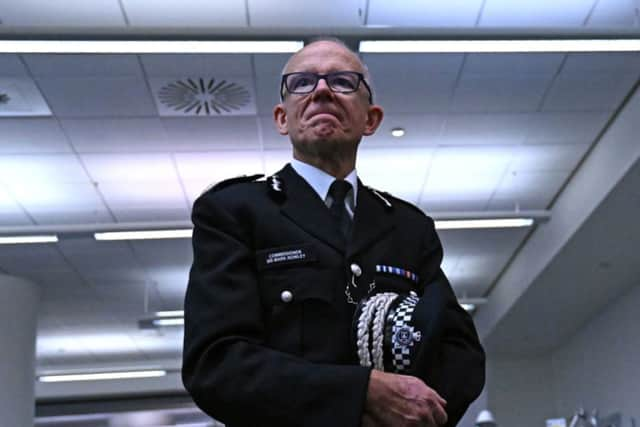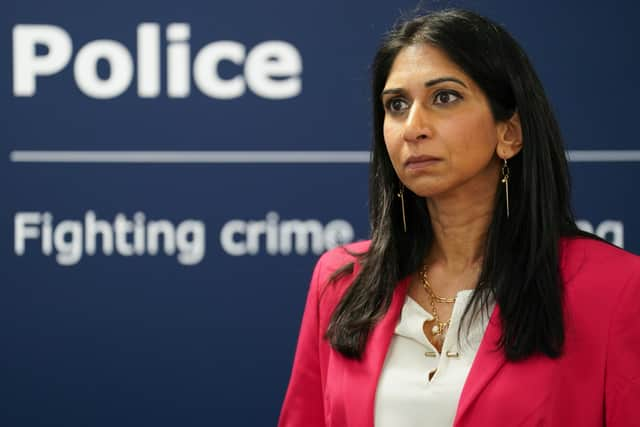Met Police: Mark Rowley says reputation ‘doesn’t help recruiting’ as London force falls short of hiring target
and live on Freeview channel 276
Metropolitan Police Commissioner Sir Mark Rowley has said the force’s reputation “doesn’t help recruiting”.
Responding to a committee of MPs about why the Met missed its recruitment target for this year, Rowley suggested the recent scandals surrounding the London police force were partly to blame - remarking that “the reputation of the organisation at the moment doesn’t help.”
Advertisement
Hide AdAdvertisement
Hide AdThis follows a series of scandals surrounding the force, including the exposure of former PC David Carrick who was jailed for at least 30 years after pleading guilty to 49 serious charges - including 24 counts of rape - all of which he committed while serving in the force. Baroness Casey also recently published a damning report into the Met, which she deemed “institutionally racist, sexist and homophobic.”
Rowley also said factors such as “the employment market” in London, which he described as “very hot and very difficult”, and the “real terms pay cut” for frontline officers had contributed to the shortfall. “We’re striving to maintain the quality too,” he told the Home Affairs Committee. “That’s really important.”
His comments came as the government reported it had reached its 2019 target of recruiting 20,000 more officers in England and Wales. The Met Police is the only force which fell short of its individual target - hiring 3,468 new recruits instead of the proposed 4,557.
“We are 1,000 officers light of our target - I wish we’d hit it, but we we haven’t,” Rowley told MPs. “There are a range of factors in this. We have recruited over the last three years more than 9,000 officers, which is the most, I think, ever in such a short period.”


Advertisement
Hide AdAdvertisement
Hide AdThe Commissioner went on to say that, while recruiting, the Met is also “striving to maintain the quality” - which he called “really important”.
Rowley apologised for the findings in the Casey Review, saying that the examples of “discrimination, the letting down of communities and victims, and the strain faced by the frontline” were “unacceptable”. He said it must be “a catalyst for reform”, promising to root out those who “should not be police officers” and change the culture for the better.
Something that Rowley says is hindering progress however is that he had “no powers” to fire police officers. This was discussed in the Home Affairs Committee, with the Commissioner reporting that he was expecting a decision from Home Secretary Suella Braverman “in the next few weeks” about whether the rules can be changed.
During a speech in Westminster, Braverman said she would give Rowley “every support as he pursues his turnaround plan” - and insisted she had “the utmost confidence in the Metropolitan Police’s new leadership team.”
Advertisement
Hide AdAdvertisement
Hide AdElsewhere in the meeting, Rowley faced criticism from a series of MPs who accused him of helping to turn the Met into a “national disgrace”.
In a heated exchange, Conservative Party backbencher James Daly said the Met had been a “complete and utter mess” for a long time and the Commissioner, as a former senior officer in the force, was one of those responsible. Similarly, Lee Anderson, another Tory MP, said he found it “pretty hard to believe” Rowley’s assertion that he could not recall any incidents that he had witnessed during his long police career.
“You must have been walking round with your eyes closed,” Anderson said, adding that the Commissioner was “in denial” about what had gone on in the past.
Rowley argued that he was currently “doubling down on standards more ferociously” than had been done for decades. He said it was “completely unacceptable” that the Met was still employing dozens of officers with criminal convinctions - but again highlighted that he needed stronger powers to dismiss these people.


Advertisement
Hide AdAdvertisement
Hide AdAnderson went on to ask Rowley whether there should be “zero-tolerance” of disruptive protests, urging the Comissioner to “leave the ivory tower and go out there and sort these people out”.
But Rowley replied: “You are making selective comments based on a partial understanding of the law. The law is very clear that protest is disruptive and to a reasonable extent that is allowed. You might not like that, but I have to work to the law rather than whim. You might want to believe the law says that no disruption is allowed whatsoever through protests, but that is not the case.”
Anderson claimed he “did not think” the Met Police Commissioner was “doing his job correctly” and asked whether he had “the confidence of the public”. Rowley accused him of being “personally offensive”, forcing committee chairwoman and Labour MP Diana Johnson to step in. “I don’t think we want to be personally offensive, we are trying to get to what the problems are in the Met and how you are going to tackle them,” she said.
Comment Guidelines
National World encourages reader discussion on our stories. User feedback, insights and back-and-forth exchanges add a rich layer of context to reporting. Please review our Community Guidelines before commenting.
